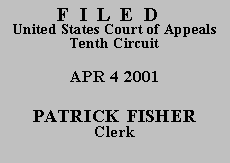

| ARTHUR R. STEWART, |
|
| v. | |
| MIKE HILL, Sheriff; ATTORNEY GENERAL OF KANSAS, |
Arthur R. Stewart, a state prisoner proceeding pro se, appeals the district court's dismissal of his habeas corpus petition under 28 U.S.C. § 2254, and its denial of his request for a certificate of appealability (COA). Because we agree with the district court that Mr. Stewart has failed to exhaust state remedies, we deny his request for a COA and dismiss this appeal.
Mr. Stewart's claim arises from the alleged failure of the District Court of Sedgwick County, Kansas, to respond to his "Motion For Discovery/Discharge or Conversion. . . to New Kansas Sentencing Grid."(1) This motion states that under Kan. Stat. Ann. § 21-4724 (2000), Mr. Stewart is eligible for "conversion" of his pre-1993 sentence to new post-1993 guidelines. Such a conversion could potentially shorten his sentence.
Mr. Stewart's Sedgwick County motion was apparently filed on or about June 12, 2000. On August 2, 2000, Mr. Stewart filed a petition for a writ of habeas corpus in federal district court. Arguing that the Sedgwick County court had failed to consider his sentencing motion, Mr. Stewart asked the district court to vacate his sentence and award him $2 million in damages. The district court dismissed Mr. Stewart's habeas petition without prejudice for failure to exhaust state remedies, as his state petition appeared to be still pending. Rec. doc. 3, at 1-2 (Dist. Ct. Order, dated Aug. 7, 2000). On Mr. Stewart's motion for reconsideration, the district court declined to reconsider its decision or grant a certificate of appealability, finding that there was no evidence Mr. Stewart had attempted to pursue his claims in the Kansas appellate courts. It did, however, grant him leave to proceed in forma pauperis on appeal. Rec. doc. 7, at 1 (Dist. Ct. Order, dated Sept. 11, 2000).
We construe Mr. Stewart's complaint liberally because he is proceeding pro se, although we will not act as his advocate. See Haines v. Kerner, 404 U.S. 519, 520-21 (1972) (per curiam). It seems that Mr. Stewart is asking for two alternative remedies, based on the alleged failure of the Sedgwick County court to respond to his motion. First, he asks that we order the Sedgwick County court to act on his motion, so as to enable him to immediately proceed through the state appellate process. See Aplt's Br. at 4. This we cannot and should not do, as federal courts have no authority to issue a writ of mandamus to a state court. See Olson v. Hart, 965 F.2d 940, 942 (10th Cir. 1992).
In the alternative, if we find the lack of a response from the state court excuses his failure to exhaust state remedies, Mr. Stewart asks that we grant him a certificate of appealability and rule on his habeas motion. See Clayton v. Gibson, 199 F.3d 1162, 1170 (10th Cir. 1999) (noting that "[t]he exhaustion requirement is not jurisdictional," and "may be waived by the state or avoided by the petitioner if an attempt to exhaust would be futile.").
We agree with the district court that Mr. Stewart has not made a sufficient attempt to exhaust any available state remedies. If the Sedgwick County court has truly erred in failing to act on his motion, Mr. Stewart's immediate remedy lies with the Kansas appellate courts. As there is no indication that Mr. Stewart has attempted to appeal, or to petition the Supreme Court of Kansas for a writ of mandamus, there is also no indication that such an attempt would be futile. See O'Sullivan v. Boerckel, 526 U.S. 838, 842 (1999) (a state prisoner must "give the state courts an opportunity to act on his claims before he presents those claims to a federal court in a habeas petition"); Duckworth v. Serrano, 454 U.S. 1, 3 (1981) (per curiam) (stating that "[a]n exception is made only if there is no opportunity to obtain redress in state court or if the corrective process is so clearly deficient as to render futile any effort to obtain relief.").
In order to obtain a certificate of appealability, an appellant must make "a substantial showing of the denial of a constitutional right." 28 U.S.C. § 2253(c)(2). Mr. Stewart has made no such showing and his request for a certificate of appealability is DENIED. Accordingly, the appeal is hereby DISMISSED.
Entered for the Court,
Robert H. Henry
Circuit Judge
*. This order and judgment is not binding precedent, except under the doctrines of law of the case, res judicata, and collateral estoppel. The court generally disfavors the citation of orders and judgments; nevertheless, an order and judgment may be cited under the terms and conditions of 10th Cir. R. 36.3.
1. This document is appended to Mr. Stewart's brief, but lacks both page numbers and an index number.